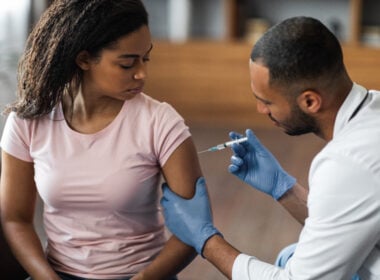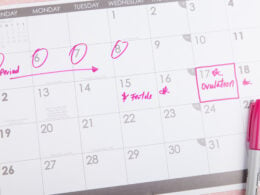My wife has excellent doctors. The kind that don’t push hormonal birth control on you, who prescribe bio-identical hormones, who recommend diet changes and supplements instead of just drugs. In the past couple of years, she has been fighting the debilitating assaults of pre-menopause. It’s been a rocky road. Anxiety with no cause, hot flashes, weight changes, blood sugar problems, tiredness. Should I mention her libido?
Anna is great at figuring out her own health stuff, researching, keeping track of her body. She eats well, she exercises like a pro, she sleeps a regular 8-hour shift most nights. For the past two years, she listened to her doctors and got on a number of medical regimens to try to calm the hormonal storms she was experiencing. With complications and without real success.
Then she remembered. About 10 years ago, Ginette, a friend of ours, had mentioned that the supplement black cohosh was helping her with menopause. Ten years ago! I don’t remember the kind of glasses I was wearing ten years ago. But my smart, health-concerned wife made a mental note. Two weeks ago, she remembered, checked it out and she went on it. Already, her anxiety is greatly reduced and the hot flashes are just a bad memory.
So what’s the moral of the story? She listened to women talk.
In a recent article, Holy Griggs Spall, the author of Sweetening the Pill (a great read if you’re considering getting off hormonal contraceptives), explains how authentic women’s talk helped her get off the Pill when neither her doctor nor women’s magazine articles were supporting her decision. On the contrary, she says these kinds of articles try to discredit women’s talk: “We hear that women think they will experience side effects as a result of ‘gossip’ and ‘rumor.'” Instead, she writes, “When I came off the Pill I found online conversations, usually started in response to an article on birth control, to be really helpful.”
In a different yet just as brilliant essay, Calah Alexander, the author of the witty Barefoot and Pregnant blog, describes how she finally figured out how to chart her cycles effectively: “The biggest breakthrough was following the advice a blogging friend gave me a few years ago, and writing down literally everything I noticed.” She’s now ecstatic, blissful, euphoric about NFP, a method she blasted in a post less than a year ago. Here again, women’s talk made the difference.
If you’re thinking about getting off contraceptives, your best source for advice is to talk to people who are practicing this way of life and those who teach fertility awareness or NFP methods. Not the mainstream media nor the medical establishment[1]. These good sources are around you. They’re online. Find the ones who have been down the path you’re taking. Unlike magazines, they have nothing to sell, but they love to help because they’re passionate about it. And then pass on this gift to others.
Reference
[1] If you are looking for teachers and medical professionals who embrace these methods, you can find some here.











